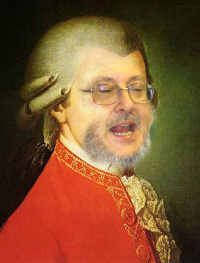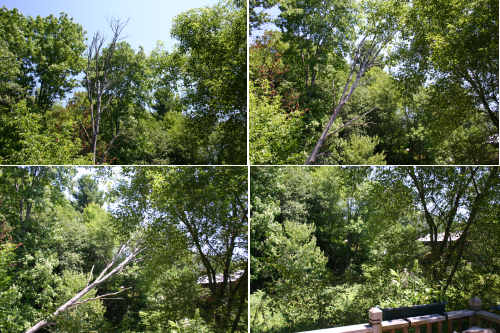A 365-Day Project
"We Are All Mozart"
A project to create
new works and change
the perception of the
music of our time.


 July 20, 2006
July 20, 2006 
Yesterday's commentary listed the growth possible through working with electroacoustic music, but none of it so clearly outlined the advantages of being an electroacoustic composer as did this note from Noah Creshevsky:
You build a self-contained music studio and wall yourself up in it with food, alcohol, and drugs. You compose self-contained (electro-acoustic) music that pleases you and at least one other person who is willing to listen and who you care about. If you are ambitious, industrious and lucky someone plays your piece on the radio or produces a "commercial" cd of it. The cd is allegedly distributed and sold in stores or over the internet. As you see, all of this is practical and believable, but the final assumption requires a leap of faith: People buy your cd and listen to your music in the privacy of their homes. There's the rub, but it's usually possible to ignore it. Granted there's a delusional factor in this equation, but it works for some of us, some of the time.
Crouching inside Noah's humor is some serious truth waiting to leap out. Although the situation for new nonpop composers is improving, it is so far out of balance that minuscule progress resembles monumental movement. It was also a reminder of Jeffery Cotton's comment that "over the last twenty years or so, the world of American art music has gone through a grueling Rococo, a vogue of flamboyance and bombast."
The confluence of the 'grueling Rococo' with that minuscule movement suggests that the audience friendly capitulation may be having an impact. A random check of orchestral concert programs and announcements in the past year reveals that in addition to the ever-dominant dead white European male chestnuts is an increase of thematic programs, including patriotic and geographical glorifications, film music arrangements, and religious themes. This increase involves new nonpop of the "American Romantic" variety -- traditional harmonic movement and often clichéd expressiveness. There is no corresponding increase in either minimalism or post-classical (to use Kyle Gann's term) on concert programs. Indeed, it appears that the minimalist and post-classic have at best replaced the modernist, leaving the token new compositions to the thematic music.
In other words, the range of composer opportunities at the orchestral level has not broadened, and therefore neither have tastes nor experiences been given a chance to grow and be enriched. Chamber concerts reveal the same. The stratification of the classical world into a particular élite and the remaining nonpop composers-at-large continues, meaning Noah's point is well-taken at a deeper and more discouragingly serious level. (In this Golden Age of new nonpop, I sometimes want to jump up in my seat at concerts, crying out in a biblical voice, "having ears, do you not hear?")
Events do conspire to discourage. Certainly the Splenda music movement is one of them, but it is not unexpected as composers make a very poor case for their work. In my survey of composers for an upcoming article (yes, still not finished), I learned that few of them compose frequently at all, and even fewer write for occasions or events or schools or even family gatherings. Whatever the reason (general unwillingness, perceived difficulty, lack of interest, overshadowing by easy-listening composers, or simply self-marketing incompetence), a wider public is being denied a richness of experience in new nonpop.
Meanwhile, entrepreneurs find their mark in composers and ensembles, and vanity projects are everywhere. The major vanity labels use cheap (but very competent) orchestra labor from Eastern Europe and a body of eager conductors to play and record the music of composers who can afford per-minute rates and travel expenses. Loosely grouped into series, vanity recordings reveal that the results of the new pseudo-patronage are all too often quality-free and represent the hopeful, self-indulgent or duped composer who's willing to pony up the money. Some say that these entrepreneurs provide a service by employing the Eastern European musicians after the fall of Communism, and by recording repertoire that would elsewise go unheard. Nevertheless, the entrepreneurs make a buck on the hopes and dreams of composers and musicians on both sides of the old Iron Curtain.
And what of the electroacoustic composers? The orchestral entrepreneurs are not alone in courting composers, with other expensive auditory venues for electroacoustic artists. Recording nonpop has been unprofitable for generations, of course, so the current crop of labels from innova and cold blue through New World and Albany is sure to expect payment via pocketbook or grant, and provide pop-priced ($15, $15, $16 and $17 respectively) CDs that don't sell.
There's no deception. In fact, innova is very clear that the artists take all the risk: "The idea is simple: Artists cover the manufacturing and marketing costs (which we struggle to keep as low as possible), either through an up-front payment or a low-interest loan (from our McKnight Recording Assistance Program). The artists then recoup those costs, or the amount of the loan, through quarterly installment payments (if the loan is used) and sales. (The break-even point is roughly 600 copies.) Once costs are paid back, 100% profits go directly to the artists; the highest in the industry. The artists also retain ownership of their recordings so there is no danger of the music going out of print, never to be retrieved."
Did I say CDs that don't sell? There is that. As a publisher as well as a composer, I am involved with other composers' recordings and get the sales reports from CD labels. In a bathos of poor promotion and delusionary high pop-CD pricing, one excellent chamber recording released several years ago on a well-known vanity label has sold fewer than a dozen copies. It will be well into the century of Jean-Luc Picard for it to make a penny's profit, by which time the penny will be gone.
Let's look at the four economic models for electroacoustic composers (acoustic composers can tack on the expense of hiring an ensemble and engineer and renting a studio for a few sessions):
- Commercial vanity label. innova estimates a budget of $5,000 for the finished recording, and that includes distribution. Where the CD goes is unknown, the feedback minimal, and sales reports occasional. The investment incurs a black hole of debt, a few radio plays, and not even a box of CDs for the back of the closet. (Laurie Spiegel once mentioned the many boxes of The Expanding Universe that she still had -- a record I purchased and treasured for years.) A commercial vanity label has one advantage: apparent prestige. "Look! Here's my CD!" "Dude! Pogus!"
- Personal vanity label. Creating one's own label is less complex than in the LP days. The many production companies all provide high-quality CDs, and a master produced from a stock Mac or PC is ideal. At a cost of $1,700 for a thousand silkscreened & jewel-boxed CDs complete with an eight-page booklet at Disc Makers, that leaves $3,300 out of the commercial label budget for your own distribution. That's a bucket of envelopes and postage, and you can even pay yourself back. Nonpop radio stations are enthusiastic about electroacoustics and form a natural audience. Sites such as CDBaby are excellent distribution hubs -- after nine years, my CD Detritus of Mating has hit the black via CDBaby sales at a nonpop bargain price of $12.
- Private copies. One-off copies or small runs are inexpensive but marginally time-consuming (copying each CD-R, printing its surface, printing a booklet, and assembling the package). There's no cachet or prestige to these private CDs, but they get the music into the hands of those who might be interested and they look better than an Office Max CD in an envelope with a Post-It note attached.
- Personal website. The web has created a multitude of niches, including fans of every obscure nonpop genre. A domain name and high-bandwidth website will cost upwards of $25 per month, maybe $50 if the music gets very, very popular -- $600 per year. Considering the unfulfilled promise of distribution from commercial vanity labels, a website with a complete set of downloads is more valuable than paying for CDs as giveaway coasters. Each downloader will leave a trace, providing a fine idea of the interested audience. Feedback forms like mine or even guestbooks can build an audience. A composer not in it for the money (see #1 and #2 above) will get a $4,000 break over a commercial vanity CD and a $1,000 break over a personal vanity CD. And you can still make some private copies for distribution. Not bad.
Oh. One more thing. If acoustic composition still medusas you over to her labyrinth, don't forget to write for local ensembles. It really doesn't hurt, and it might -- just might -- give a friendly face to the realm of nonpop. We are all ambassadors with our music, ourselves.
Now to highlight the greatest truth in Noah's comments: You compose ... music that pleases you and at least one other person who is willing to listen and who you care about.
Speak it, brother Noah.

We kept it until no more leaves appeared this spring. So the ancient, fifty-foot elm finally reached its end and came down this afternoon in a grand crash. It will help heat us this winter.